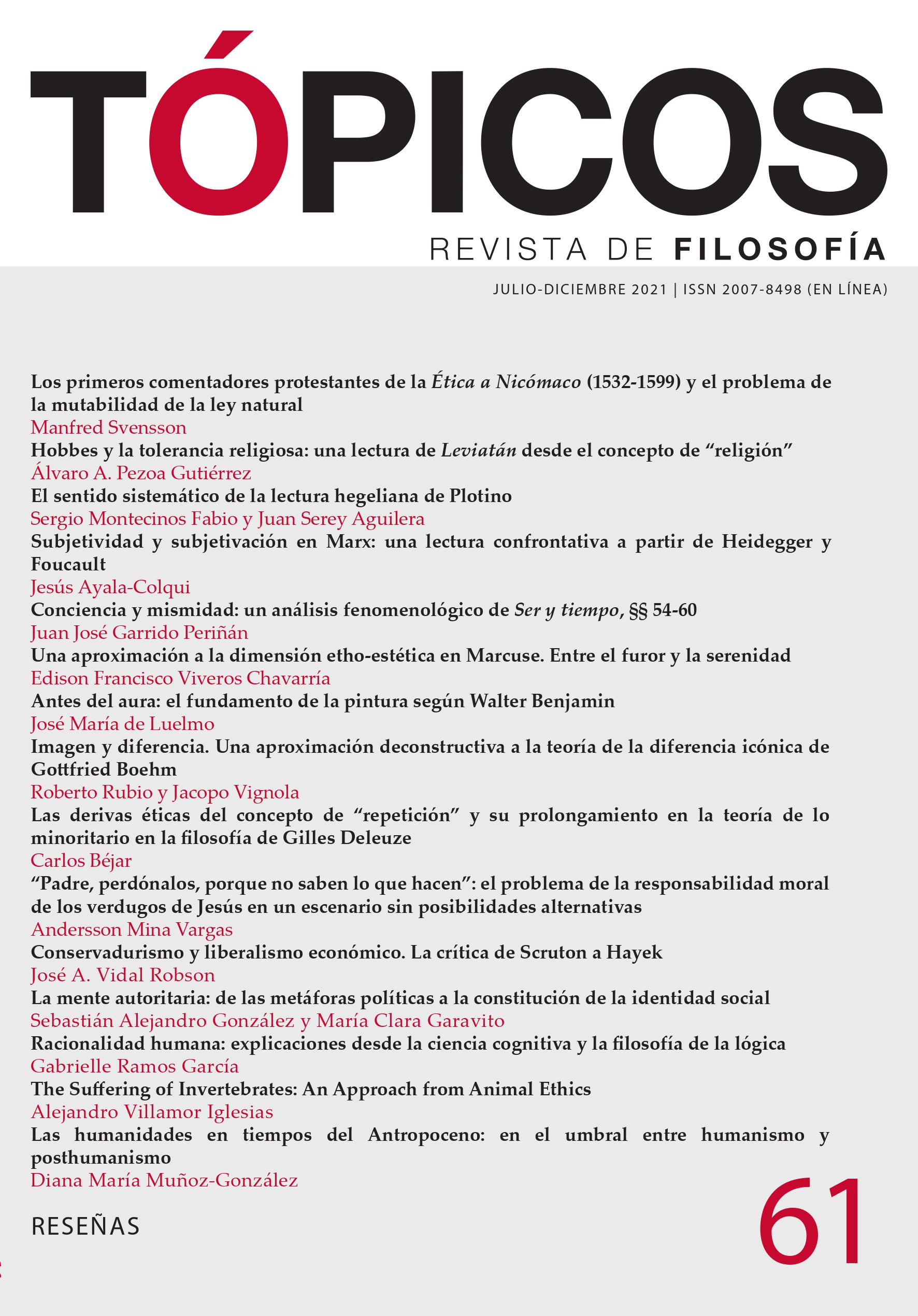Published 2021-06-23
Keywords
- speculative dialectics,
- Neoplatonism,
- history of philosophy,
- nous,
- synthesis
- totality,
- system ...More
Copyright (c) 2021 Tópicos, Revista de Filosofía

This work is licensed under a Creative Commons Attribution-NonCommercial-NoDerivatives 4.0 International License.
How to Cite
Abstract
There is an affinity between Hegel’s philosophy and Neoplatonism that Hegel himself explicitly pointed out. We claim that this affinity is due to systematic reasons and involves theoretical and practical aspects of both philosophies. To argue in that direction, we address the thematization of Plotinus’s philosophy in the Hegelian Lessons on the history of philosophy. We seek to show that, according to Hegel, Plotinus elaborates in ancient times, for the first time, a complex synthesis of the philosophical principles that precede his own thought, and for this reason Hegel’s speculative exposition ascribes to Neoplatonism the logical category of totality. In this synthesis of finite principles —which we will seek to determine in this paper—, Hegel recognizes tasks and problems close to those of his own philosophy. However, can it be asserted that Hegel’s philosophy is for this reason a modern Neoplatonism, or is there a point at which both projects are revealed to have a fundamental incompatibility?
References
- Aristóteles. (1998). Metafísica. V. García Yebra (trad.). Gredos.
- Beierwaltes, W. (1967). Zeit, das „Leben der Seele“. En Plotino, Über Ewigkeit und Zeit (Enneade III, 7). (pp. 62-74). W. Beierwaltes (trad.). Klostermann.
- Beierwaltes, W. (2004a). Hegel und Proklos. En Platonismus und Idealismus. (pp. 154-187). Klostermann.
- Beierwaltes, W. (2004b). Plotin im deutschen Idealismus. En Platonismus und Idealismus. (pp. 82-153). Klostermann.
- Düsing, K. (1983). Hegel und die Geschichte der Philosophie. Wissenschaftliche Buchgesellschaft.
- Duque, F. (2018). Remnants of Hegel. Remains of Ontology, Religion, and Community, SUNY Press.
- Gabriel, M. (2009). Skeptizismus und Idealismus in der Antike. Suhrkamp.
- Halfwassen, J. (1999). Hegel und der spätantike Neuplatonismus. Untersuchungen zur Metaphysik des Einen und des Nous in Hegels spekulativer und geschichtlicher Deutung. Bouvier.
- Hegel, G. W. F. (1968a). Differenz des Fichte’schen und Schelling’schen Systems der Philosophie. En Gesammelte Werke. Band 4. Jenaer kritische Schriften. (pp. 5-92). H. Buchner y O. Pöggeler (eds.). Meiner.
- Hegel, G. W. F. (1968b). Glauben und Wissen oder die Reflexionsphilosophie der Subjectivität, in der Vollständigkeit ihrer Formen, als Kantische, Jacobische, und Fichtesche Philosophie. En Gesammelte Werke. Band 4. Jenaer kritische Schriften. (pp. 315-414). H. Buchner y O. Pöggeler (eds.). Meiner.
- Hegel, G. W. F. (1968c). Verhältnis des Skeptizismus zur Philosophie, Darstellung seiner verschiedenen Modificationen, und Vergleichung des neusten mit den alten. En Gesammelte Werke. Band 4. Jenaer kritische Schriften. (pp. 197-238). H. Buchner y O. Pöggeler (eds.). Meiner.
- Hegel, G. W. F. (1971). Gesammelte Werke. Band 9. Phänomenologie des Geistes. W. Bonsiepen y R. Heede (eds.). Meiner.
- Hegel, G. W. F. (1978). Gesammelte Werke. Band 11. Wissenschaft der Logik. Erster Band. Die objektive Logik (1812/13). F. Hogemann y W. Jaeschke (eds.). Meiner.
- Hegel, G. W. F. (1986a). Werke. 19. Vorlesungen über die Geschichte der Philosophie. II. Suhrkamp.
- Hegel, G. W. F. (1986b). Werke. 20. Vorlesungen über die Geschichte der Philosophie. III. Suhrkamp.
- Hegel, G. W. F. (1991). Enzyklopädie der philosophischen Wissenschaften (1830). F. Nicolin y O. Pöggeler (eds.). Meiner.
- Hegel, G. W. F. (1992). Gesammelte Werke. Band 12. Wissenschaft der Logik. Zweiter Band. Die subjektive Logik (1816). H. Gawoll, F. Hogemann y W. Jaeschke (eds.). Meiner.
- Hegel, G. W. F. (1998a). Fragmente aus Vorlesungsmanuskripten (1801/02). En Gesammelte Werke. Band 5. Schriften und Entwürfe (1799-1808). (pp. 255-273). M. Baum y K. Meist (eds.). Meiner.
- Hegel, G. W. F. (1998b). Gesammelte Werke. Band 21. Wissenschaft der Logik. Erster Band. Die Lehre vom Sein (1832). F. Hogemann y W. Jaeschke (eds.). Meiner.
- Hegel, G. W. F. (2006). Relación del escepticismo con la filosofía. M. Paredes (trad.). Biblioteca Nueva.
- Hegel, G. W. F. (2008). Enciclopedia de las ciencias filosóficas en compendio. R. Valls Plana (trad.). Alianza.
- Hegel, G. W. F. (2011). Ciencia de la lógica. I. La lógica objetiva. F. Duque (trad.). Abada.
- Hegel, G. W. F. (2015). Ciencia de la Lógica. II. La lógica subjetiva (1816). F. Duque (trad.). Abada.
- Hegel, G. W. F. (2016). Gesammelte Werke. Band 30/1. Vorlesungen über die Geschichte der Philosophie. I. Nachschriften zu den Kollegien 1819 und 1820/21. K. Grotsch (ed.). Meiner.
- Hogemann, F. (1994). Die Idee des Guten in Hegels Wissenschaft der Logik. Hegel-Studien, 29, 79-102.
- Kimmerle, H. (1967). Dokumente zu Hegels Jenaer Dozenttätigkeit (1801-1807). Hegel-Studien, 4, 21-99.
- Martino, G. (2014). La noción de ousía en el didaskalikós de Alcínoo. Revista de Filosofía y Teoría Política, 45, 1-27. URL: http://www.rfytp.fahce.unlp.edu.ar/article/view/RFyTPn45a02.
- Nuzzo, A. (1995). Zur logischen Bestimmung des Ontologischen Gottesbeweis. Bemerkungen zum Begriff der Existenz im Anschluss an Hegel. Hegel-Studien, 30, 105-120.
- Plotino. (1992). Enéadas I-II. En Porfirio y Plotino, Vida de Plotino. Enéadas I-II. J. Igal (trad.). Gredos.
- Plotino. (1998). Enéadas V-VI. J. Igal (trad.). Gredos.
- Ramos Jurado, E. Á. (2006). De Platón a los neoplatónicos: escritura y pensamiento griego. Síntesis.
- Rohs, P. (1982). Form und Grund. Bouvier.
- Sell, A. (2006). La technique mécanique ou chimique dans la Science de la logique. En J.-M. Buée, E. Renault y D. Wittmann (eds.), Logique et sciences concrètes (nature et esprit) dans le système hégélien. (pp. 95-112). Harmattan.
- Spinoza, B. (2015). Ethik in geometrischer Ordnung dargestellt. W. Bartuschat (trad.). Meiner.
- Vigo, A. (1999). Intelecto, pensamiento y conocimiento de sí. La estructura de la autoconsciencia en Plotino (V 3). Acta philosophica, 8, 45-68. URL: http://www.actaphilosophica.it/sites/default/files/pdf/vigo-19991.pdf
- Zamora, J. M. (2018). ¿Cómo elevarse a lo divino? Sobre las últimas palabras de Plotino. Synthesis, 25(1), 95-112. DOI: https://doi.org/10.24215/1851779Xe032.






